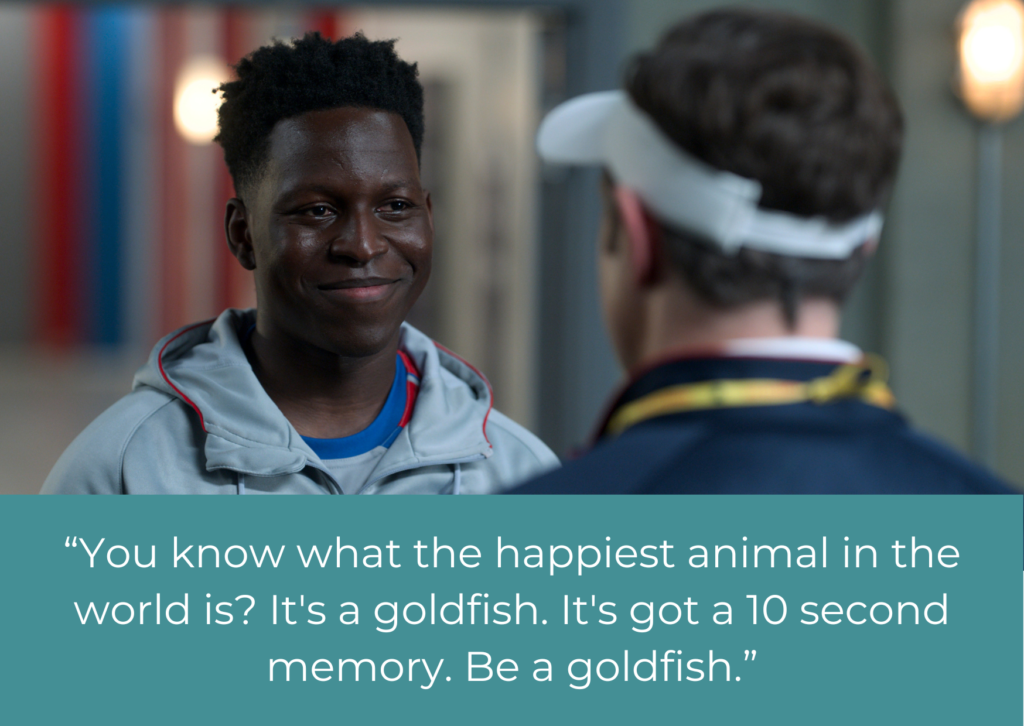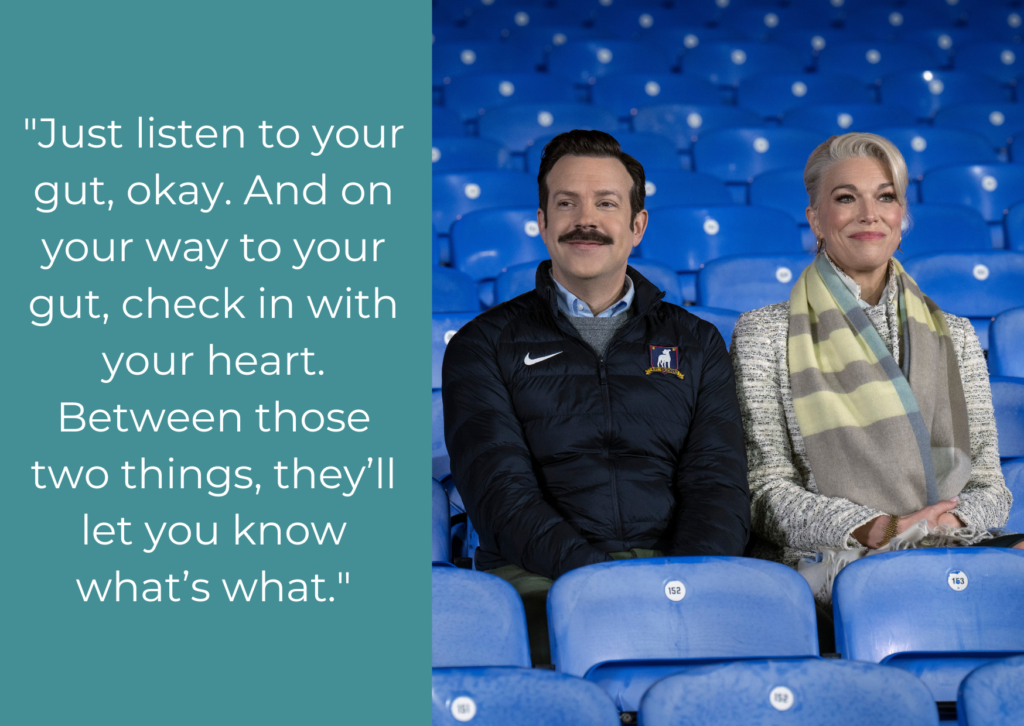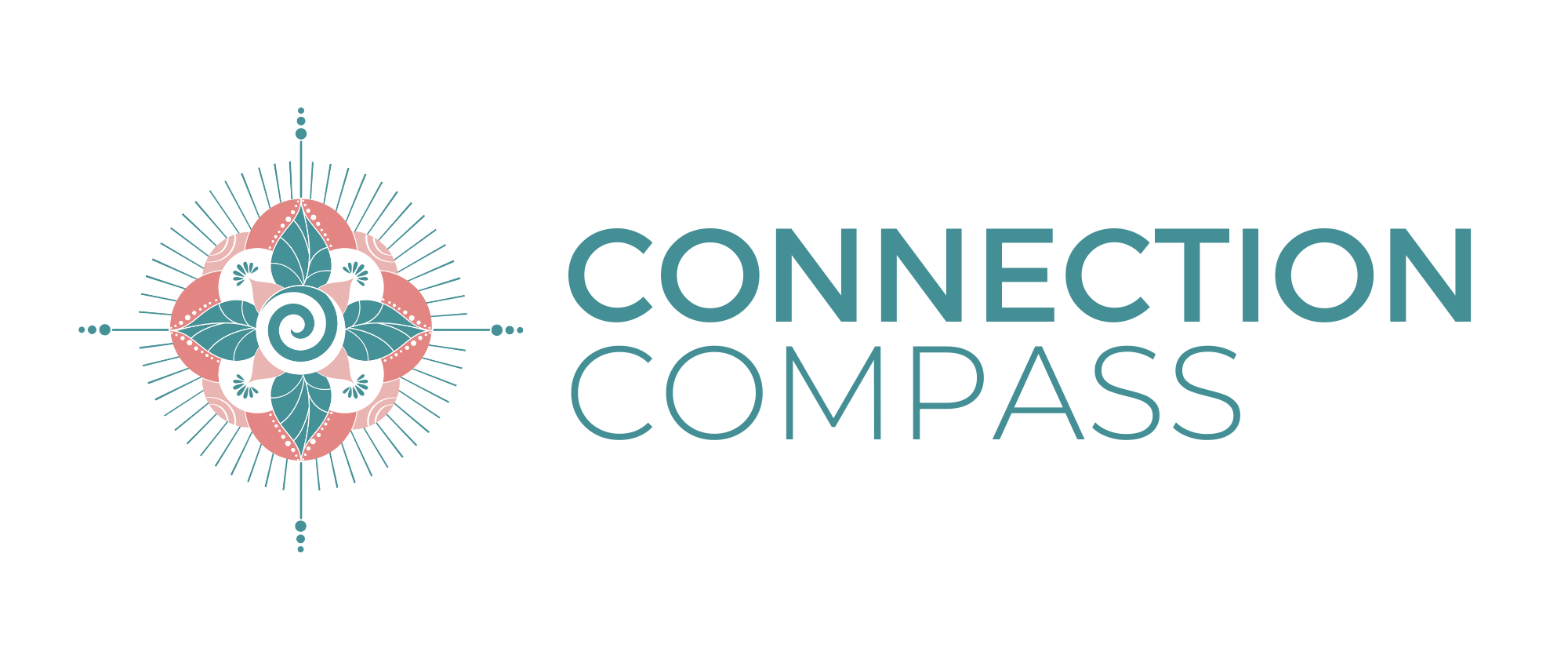
If you haven’t yet jumped on the Ted Lasso bandwagon, what the heck are you waiting for? Get ready to laugh, cry, clap and scream – it’s a feel-good show that takes you on a journey of human spirit and connection.
The Apple TV series is about a perpetually optimistic American football coach, Ted Lasso, brought to England to coach a floundering AFC Richmond premier league soccer team. By all accounts, Ted was set up to fail. With no knowledge or experience of soccer, he faced an uphill battle to unite the fractured team, get some wins under his belt, and prove himself to skeptical media and fans.
The show demonstrates pure mastery of behavioural science and positive psychology, and we all have much to learn from Coach Ted Lasso. Through our witnessing of Ted coach the team and mentor those around him, we, as the audience, are also taken on the coaching journey. I’d like to think that at the end of the three seasons, we, the audience, are also better versions of ourselves.
Through the lens of connection, Ted Lasso takes us on an inward journey. The show gifts us with pearls of wisdom about how we can come into greater alignment with ourselves and those around us.
On success:
“For me success is not about the wins and losses, it’s about helping these young fellas be the best versions of themselves on and off the field.”
Ted constantly maintains that he isn’t motivated by whether the team wins or loses. Instead, he is focused on inspiring the players and wider team to step into their highest selves. It’s beautiful to witness this unfolding over the three seasons. As Ted weaves his magic, his message is for us to know ourselves, find the inherent confidence within and trust our self-worth, while being honest, respectful and cohesive in the teams and groups around us.
On being curious:
“Be curious, not judgemental.”
In season 1, episode 8, Ted quoted this line by Walt Whitman (who, incidentally, never said those words). Ted was explaining how he has been underestimated his whole life. While in the past it bothered him, one day he realised he was being judged based on other people’s preconceived beliefs and ideas. Those people weren’t being curious. They didn’t take time to ask simple questions that would have informed them about Ted’s strengths and skills.
A blindspot appears for us when we judge others based on our own worldview and thoughts. Instead, we see more clearly by fostering a spirit of curiosity. This can be achieved by learning to ask better quality questions of ourselves and others.
On shared experience:
“Be grateful that you’re going through this sad moment with all these other folks. I promise you, there is something worse out there than being sad, and that’s being alone and sad.”
As Ted comforts the Richmond players and executives after a heartbreaking loss, he reminds us that it’s OK to be sad and angry – to feel all the feels. But while doing so, to not lose sight of who is around us and going through the same emotions. Togetherness and shared experiences are true gifts of humanity.
On being vulnerable:
“Every choice is a chance, fellas. And I didn’t give myself a chance to build further trust with y’all.”
This leads us to the character arc of Ted Lasso. As a coach, he was dedicated to uplifting and unifying AFC Richmond. As a person, he kept his own mental health and personal issues hidden. As a coach, he was committed to understanding his players and helping them grow and overcome challenges. As a person, he closed himself off from accepting help and held back from sharing his struggles and suffering with others. Yet, over time, he comes to realise that keeping his struggles inside cost him the opportunity to build trust with those around him. We often forget that being vulnerable and open – especially to those we are there to support (our teams, our clients, our children) – provides an opportunity for further growth and deepening of trust.
On not holding on:
“Be a goldfish.”

A beautiful dynamic between Ted and star player Sam Obisanya carries through the show. Across the three seasons, Ted and Sam remind the team how to let go of losses and grievances, by “being a goldfish”. While science has debunked the old wives’ tale that goldfish only have a 10 second memory, we understand the gist of the message.
Don’t hold on. Let go of those little and big things that we no longer have any control over. We can learn, we can feel the emotion of them, but there is no need to fixate on them or for them to prevent us from moving forward to potential wins and connection.
On trusting:
“Believing in “rom-communism” is all about believing that everything is going to work out in the end. Now these next few months might be tricky but that’s just ‘cos we’re going through our dark forest. Fairytales do not start, nor do they end, in the dark forest. That son of a gun [the dark forest] always shows up smack dab in the middle of a story. But it will all work out. Now, it may not work out how you think it will. Or how you hope it does. But believe me, it all will work out. Exactly as it’s supposed to. Our job is to have zero expectations and just let go.”
The team is going through a slump, which Ted refers to as “their dark forest” – you know, that scary and challenging place in fairytales. It’s the part of the story where protagonists come face-to-face with their demons and are on the brink of giving up. Yet they know they’ve come too far, they’ve seen too much, and the only way to go is forward. So, they face their demons, they keep moving and finally they make their way out of the dark forest, victorious. Usually they come out as better and stronger versions of themselves.
Ted, although an eternal optimist, does have two feet on the ground. He teaches us that having belief and trust that things will work out, doesn’t mean they need to work out the way we want them to. Belief and trust requires openness. There is no space in belief for rigidity of thinking. There is no room in trust for holding onto expectations. Belief is about being open to the unfolding and having trust that things will work out. Heck, things may even go better than our limited ego and minds may conjure up! Trust is keeping an open heart.
On inner wisdom:
“Just listen to your gut, okay. And on your way to your gut, check in with your heart. Between those two things, they’ll let you know what’s what.”

Ted reminds us that when making decisions, sometimes (oftentimes?) it’s OK to block out what the mind is saying, and instead trust your intuition. At the same time, listen to our hearts (heart energy is openness). Between our intuition and heart, we know what to do.
On belief:
“Belief doesn’t just happen because you hang something up on a wall [referring to the Believe sign in the locker-room]. Alright? It comes from in here [heart), you know, and up here [mind], and down here [gut]. Only problem is we all got so much junk floating through us, a lot of time we end up getting in our own way. You know, crap like envy or fear or shame. I don’t want to mess around with that shit anymore. You know what I want to mess around with? The belief that I matter. Regardless of what I do or don’t achieve. Or the belief that we all deserve to be loved. Whether we’ve been hurt or maybe we’ve hurt somebody else. Well, what about the belief of hope? That’s what I want to mess with. Believing that things can get better. That I can get better. That we will get better. Oh man, to believe in yourself. To believe in one another. Man, that’s fundamental to being alive.”
Amen to Ted.
On holding space:
Roy: “Wait, so sometimes the f&*cking diamond dogs is just chatting about shit and no one has to f&*cking solve anything and nothing f&*cking changes.”
Ted: “Sometimes, yeah.”
One of the greatest gifts we can give someone is to hold space for them. What does holding space look like? We be quiet and listen. We let them share. We let them feel. We refrain from giving advice. We refrain from giving our opinion. Instead, we provide a safe space for them to offer their thoughts and feelings. We see them. We hear them. We feel with them. It’s powerful.
On forgiveness:
Ted: “You know Jamie, if hating your Pops isn’t motivating you like it used to, it might be time to try something different. Just forgive him.”
Jamie: “No f&*k that, I ain’t giving him that.”
Ted: “No, you ain’t giving him anything. When you choose to do that, you’re giving that to yourself.”
Forgiveness is not well understood in our society. Forgiveness is not about denying what’s happened, excusing past behaviour or releasing accountability of others. We’re reminded by Ted that true forgiveness is for ourselves. True forgiveness is to give ourselves freedom. Freedom from the corrosive and deeply held pain and anger we’re holding onto. This freedom allows us to heal and move forward in our lives.
On judgement and second chances:
“I hope that either all of us or none of us are judged by the actions of our weakest moments, but rather by the strength we show when and if we’re ever given a second chance.”
This is a good quote to lead on from forgiveness. Ted reminds us that as humans, we will make mistakes. We will hurt other people. We will hurt ourselves. As humans, we also are equipped with compassion. We know how it feels to make mistakes. We know how it feels to hurt others, or hurt ourselves. We know how it feels to be given a second chance (or a third chance, a fourth chance, a fifth chance and so on). We also know how it feels to show up differently and take accountability for our actions. We are reminded by Ted, that we can offer compassion as a response to other people’s actions, rather than judgement.
I hope you enjoyed these lessons from the Ted Lasso show. These are just a few of the many moments of connection and insights from the show that we can bring into our own daily life.
To the writers and producers of Ted Lasso – Jason Sudeikis (who plays Ted Lasso), Brendan Hunt (who plays Beard), Bill Lawrence and Joe Kelly – thank you! It is a show that entertains, but it goes much, much deeper than that. Thank you for helping us feel more deeply and love more fiercely. #believe
Cherie Pasion
Cherie Pasion is the founder of Connection Compass, providing coaching for women wanting to live a connection-filled life. A certified life coach and behaviour change specialist, Cherie has run award-winning behaviour change programs helping thousands of people across Australia. Cherie holds a Master of Social Science, Bachelor of Business, and Diplomas of Neuro Linguistic Programming and Shinrin Yoku (Forest Bathing). Cherie is also an internationally-published author.Sign up for our newsletter
Let's connect
Connection Compass acknowledges the Turrbal and Jagara people, the Traditional Custodians of the land on which we work, live, and gather. We pay our respect to Elders past, present and emerging, and draw inspiration from their connection to Country, community and spirit.


